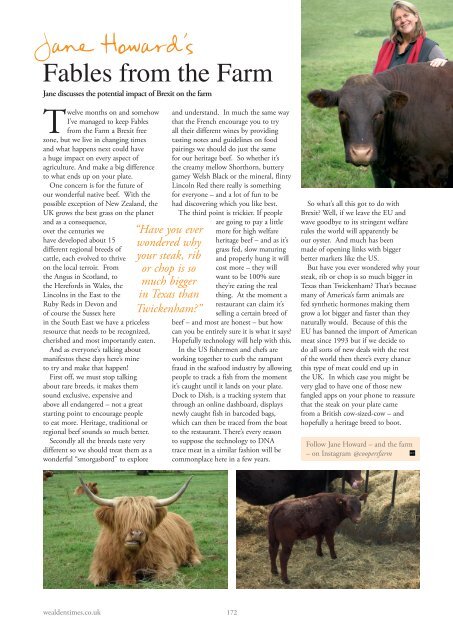Wealden Times | WT184 | June 2017 | Kitchen & Bathroom supplement inside
Wealden Times - The lifestyle magazine for the Weald
Wealden Times - The lifestyle magazine for the Weald
You also want an ePaper? Increase the reach of your titles
YUMPU automatically turns print PDFs into web optimized ePapers that Google loves.
Jane Howard’s<br />
Fables from the Farm<br />
Jane discusses the potential impact of Brexit on the farm<br />
Twelve months on and somehow<br />
I’ve managed to keep Fables<br />
from the Farm a Brexit free<br />
zone, but we live in changing times<br />
and what happens next could have<br />
a huge impact on every aspect of<br />
agriculture. And make a big difference<br />
to what ends up on your plate.<br />
One concern is for the future of<br />
our wonderful native beef. With the<br />
possible exception of New Zealand, the<br />
UK grows the best grass on the planet<br />
and as a consequence,<br />
over the centuries we<br />
have developed about 15<br />
different regional breeds of<br />
cattle, each evolved to thrive<br />
on the local terroir. From<br />
the Angus in Scotland, to<br />
the Herefords in Wales, the<br />
Lincolns in the East to the<br />
Ruby Reds in Devon and<br />
of course the Sussex here<br />
in the South East we have a priceless<br />
resource that needs to be recognized,<br />
cherished and most importantly eaten.<br />
And as everyone’s talking about<br />
manifestos these days here’s mine<br />
to try and make that happen!<br />
First off, we must stop talking<br />
about rare breeds, it makes them<br />
sound exclusive, expensive and<br />
above all endangered – not a great<br />
starting point to encourage people<br />
to eat more. Heritage, traditional or<br />
regional beef sounds so much better.<br />
Secondly all the breeds taste very<br />
different so we should treat them as a<br />
wonderful “smorgasbord” to explore<br />
“Have you ever<br />
wondered why<br />
your steak, rib<br />
or chop is so<br />
much bigger<br />
in Texas than<br />
Twickenham?”<br />
and understand. In much the same way<br />
that the French encourage you to try<br />
all their different wines by providing<br />
tasting notes and guidelines on food<br />
pairings we should do just the same<br />
for our heritage beef. So whether it’s<br />
the creamy mellow Shorthorn, buttery<br />
gamey Welsh Black or the mineral, flinty<br />
Lincoln Red there really is something<br />
for everyone – and a lot of fun to be<br />
had discovering which you like best.<br />
The third point is trickier. If people<br />
are going to pay a little<br />
more for high welfare<br />
heritage beef – and as it’s<br />
grass fed, slow maturing<br />
and properly hung it will<br />
cost more – they will<br />
want to be 100% sure<br />
they’re eating the real<br />
thing. At the moment a<br />
restaurant can claim it’s<br />
selling a certain breed of<br />
beef – and most are honest – but how<br />
can you be entirely sure it is what it says?<br />
Hopefully technology will help with this.<br />
In the US fishermen and chefs are<br />
working together to curb the rampant<br />
fraud in the seafood industry by allowing<br />
people to track a fish from the moment<br />
it’s caught until it lands on your plate.<br />
Dock to Dish, is a tracking system that<br />
through an online dashboard, displays<br />
newly caught fish in barcoded bags,<br />
which can then be traced from the boat<br />
to the restaurant. There’s every reason<br />
to suppose the technology to DNA<br />
trace meat in a similar fashion will be<br />
commonplace here in a few years.<br />
So what’s all this got to do with<br />
Brexit? Well, if we leave the EU and<br />
wave goodbye to its stringent welfare<br />
rules the world will apparently be<br />
our oyster. And much has been<br />
made of opening links with bigger<br />
better markets like the US.<br />
But have you ever wondered why your<br />
steak, rib or chop is so much bigger in<br />
Texas than Twickenham? That’s because<br />
many of America’s farm animals are<br />
fed synthetic hormones making them<br />
grow a lot bigger and faster than they<br />
naturally would. Because of this the<br />
EU has banned the import of American<br />
meat since 1993 but if we decide to<br />
do all sorts of new deals with the rest<br />
of the world then there’s every chance<br />
this type of meat could end up in<br />
the UK. In which case you might be<br />
very glad to have one of those new<br />
fangled apps on your phone to reassure<br />
that the steak on your plate came<br />
from a British cow-sized-cow – and<br />
hopefully a heritage breed to boot.<br />
Follow Jane Howard – and the farm<br />
– on Instagram @coopersfarm<br />
wealdentimes.co.uk<br />
172


















